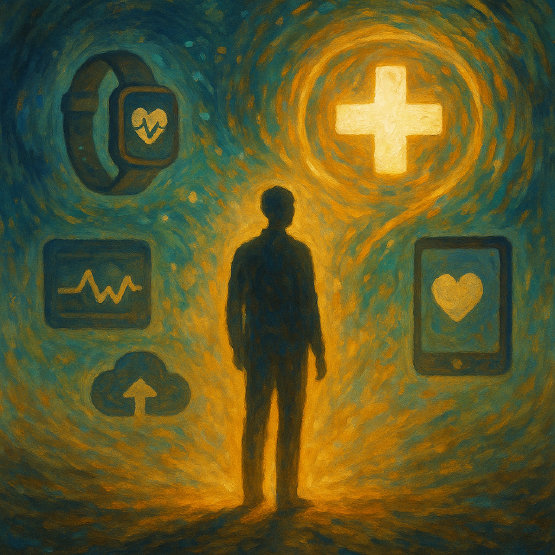The Renaissance of Digital Healthcare
Breaking the Boundaries between Technology and Healthcare
As of 2025, we find ourselves at a significant turning point where the boundaries between technology and healthcare are blurring. Digital healthcare innovations are redefining the essential paradigm of medicine beyond mere technological adoption. This marks a major shift from a 'reactive model' that treats diseases to a 'preventive and personalized model' that protects health, while also raising ethical questions about responsibility and dignity in life. In this article, we intend to explore the specific achievements of technological advancement, along with the ethical dilemmas that lurk behind, the issues of equity and trust, and the policy challenges for the future.
Technology that predicts and customizes life, setting a new standard
Wearable devices, artificial intelligence, big data. These three words can now be considered the new vocabulary of healthcare. Wearable technology that measures information such as heart rate, blood sugar, and sleep patterns in real-time monitors and predicts health status in an individual's daily life. This information is analyzed by artificial intelligence, which alerts individuals before diseases occur and proposes treatments considering genetic characteristics. - Advancement of wearable technology - Importance of AI analysis - Innovation in responding to rare diseases Meanwhile, cloud-based data integration enables the creation of a 'medical network society' that connects hospitals, research institutes, and pharmaceutical companies. Notably, significant progress is being made in areas such as rare diseases and complex genetic disorders, which were challenging to address with existing systems this leads to positive effects not only on the quality of healthcare services but also on equity.
The Leakage and Control of Life Information, the Challenge of 'Transparent Protection'
However, as technology began to handle life, data became no longer just information, but rather 'a part of personality.' In the process of distributing sensitive health information by medical institutions, insurance companies, and research organizations, individuals' privacy and autonomy are often at risk of being violated. - Importance of data privacy - Human rights issues of information - Need for institutional solutions Technological safeguards such as encryption and anonymization have been established, but the risks of data breaches and discriminatory use still persist. In particular, differentiated insurance premiums based on health information or the potential for disadvantages in employment can lead to new social inequalities. Therefore, the advancement of digital healthcare also entails a new bioethical challenge of 'information human rights,' and urgent institutional solutions are needed.
Breaking down the boundaries of cloud, sharing economy, and healthcare
Cloud infrastructure is transforming data into a shareable resource for the healthcare experience itself. Medical data generated from around the world is being shared in real-time, significantly accelerating drug development, clinical trials, and predictive modeling. - Cloud-based innovation - Sharing of medical data - Advancement of telemedicine The sharing economy is being implemented in various ways, such as sharing medical devices, telemedicine, and mobile health apps, bringing great hope to areas with insufficient healthcare infrastructure. An era has arrived where a specialist consultation is possible even in remote villages with just a smartphone. This redefines healthcare from 'geographic distance' to 'digital connectivity'.
A new language that speaks about visual culture, media, and healthcare
We now view health through images, learn through videos, and share on social media. Visual content goes beyond simple information delivery it is a powerful medium that evokes emotions and empathy, and facilitates ethical reflection. For example, a single photo of a skin disease can change the social perception of the illness and bring patients' suffering to the surface. - The role of visual content - The importance of empathy - Changes in medical education Additionally, medical schools are expanding education that develops empathy and moral judgment through virtual reality-based simulations and biomedical ethics dilemma videos. The intersection of healthcare and media is not just about knowledge transfer but is achieving the 'culturalization of medicine.'
Whose Side is Technology On: The Ultimate Question of Ensuring Fairness
Does digital technology fill the gaps in healthcare, or does it create another form of inequality? This is the most profound question posed by today's healthcare. If the datasets analyzed by artificial intelligence exclude or distort certain races, genders, or age groups, the results can lead to deadly healthcare disparities. - The importance of fairness - Efforts for unbiased technology - The need for discussion in initial design Therefore, we must implement algorithmic oversight, transparent auditing systems, and user-centered ethical design for 'unbiased technology.' Policies and regulations for this should no longer be reactive but elements that need to be discussed 'from the early stages of design.'
Technology of Trust, Philosophy of Life
Ultimately, the future of digital healthcare depends on the harmony between technological sophistication and ethical responsibility. A trusted system, an inclusive and safe healthcare environment, and a data ecosystem in which autonomy and public interest coexist must be established. - The importance of trust - Inclusive healthcare environment - The revival of humanistic medicine The future healthcare we build must go beyond mere technology for curing diseases. It should be a philosophical medicine that understands people, respects life, and extends a hand first to the socially vulnerable, essentially a revival of humanistic medicine. Digital innovation began with technological advancement, but its culmination must lead to 'trust in people.' This is the new standard of healthcare we must collectively reach.

Post a Comment